Keir Starmer Is Scrambling To Contain Labour Row On Gaza Support
The row in the party over its position on a Gaza ceasefire is becoming one of the biggest challenges of Keir Starmer's leadership so far. (Alamy)
8 min read
Labour is embroiled by an internal battle over messaging on Gaza as Keir Starmer resists pressure to call for a ceasefire in the region, instead aligning with UK and other international governments on addressing the growing humanitarian crisis in the region.
On Wednesday Starmer held an impromptu meeting in parliament with a group of Muslim MPs to discuss the crisis in Gaza, with members of the shadow cabinet also in attendance.
The meeting followed 150 Muslim Labour councillors writing to Starmer and deputy Labour leader Angela Rayner on Wednesday morning calling on leadership to back an immediate ceasefire between Israel and Hamas, as the death toll in Gaza soars. Dozens of Labour councillors across the UK have also resigned over Labour’s position on the war.
PoliticsHome understands that Rayner and shadow justice secretary Shabana Mahmood joined Starmer and the group of Labour Muslim MPs to listen to their concerns on Wednesday. According to somebody present, the meeting was constructive, with each MP present given time to express their concerns and those of their constituents, with the Labour leader apparently in "listening mode". While Starmer has not called for a ceasefire in the region, it is understood that he did not rule out calling for one further down the line when there may be greater international and diplomatic consensus on the issue.
Following the meeting, in a statement Starmer said: "We welcome [US] secretary [of state] Blinken’s comments last night and we support humanitarian pauses. In the long term there can only be a political solution to this crisis which is why we need to restart the hard work of talks for a two-state solution of a viable Palestinian state alongside a safe and secure Israel.”
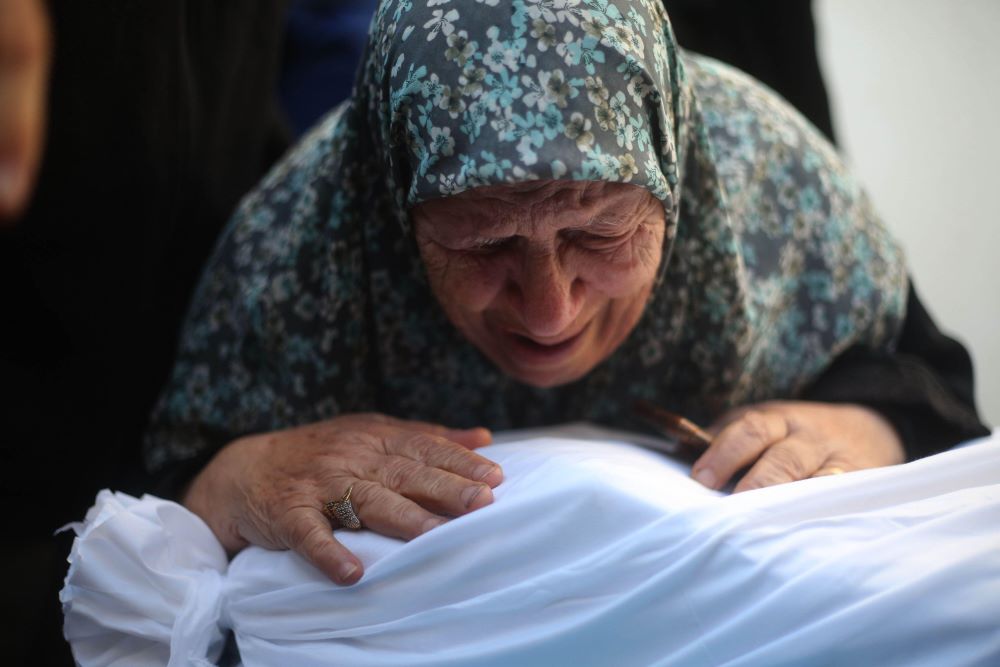 A woman mourns for her relative at a hospital in the southern Gaza Strip. 21 October. (Alamy
A woman mourns for her relative at a hospital in the southern Gaza Strip. 21 October. (Alamy
The Hamas-run health ministry says almost 6,500 people have been killed in Gaza since the war began on 7 October after a massive terror attack by Hamas on Israel killed 1,400 Israelis. Over 200 Israelis are currently also being held hostage in Gaza.
Alongside government, Labour has not called for a ceasefire in the region, instead backing US calls for a "humanitarian pause" in the conflict in order to allow aid to reach civilians. In parliament on Monday, Starmer repeated his position that Israel "has the right to defend herself" after the "barbarism" of Hamas.
But Labour in particular had faced repeated calls from within its party ranks to explicitly call for a ceasefire, and with the row threatening to become one of Starmer's biggest challenges since becoming leader in 2020.
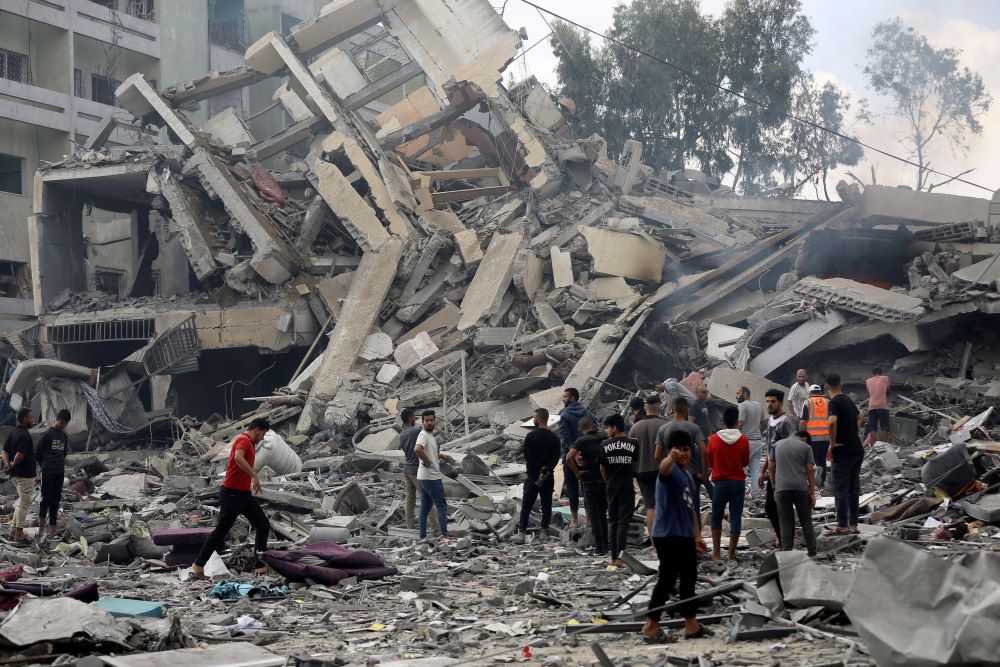 Israel has led a deadly and sustained campaign of bombing in Gaza against what it says are Hamas targets since the terror attacks on 7 October. (Alamy)
Israel has led a deadly and sustained campaign of bombing in Gaza against what it says are Hamas targets since the terror attacks on 7 October. (Alamy)
In parliament on Wednesday, Shadow equalities minister Yasmin Qureshi appeared to break ranks from the party's line and called for Prime Minister Rishi Sunak to support a ceasefire in Gaza.
"Save the Children record that one child is killed every 15 minutes [in Gaza]," Qureshi said. "And as I speak, the lives of 130 babies in incubators are in danger if fuel does not reach their hospital in time. This is collective punishment of the Palestinian people in Gaza for crimes they did not commit. How many more innocent Palestinians must die before this prime minister calls for humanitarian ceasefire?"
Earlier this week former shadow justice secretary and Labour MP Richard Burgon wrote in The House magazine calling on his party to back a ceasefire, and said the the Prime Minister and foreign secretary "should be straining every sinew and using every diplomatic tool to get as many governments as possible to press all parties to agree to an immediate de-escalation and cessation of hostilities".
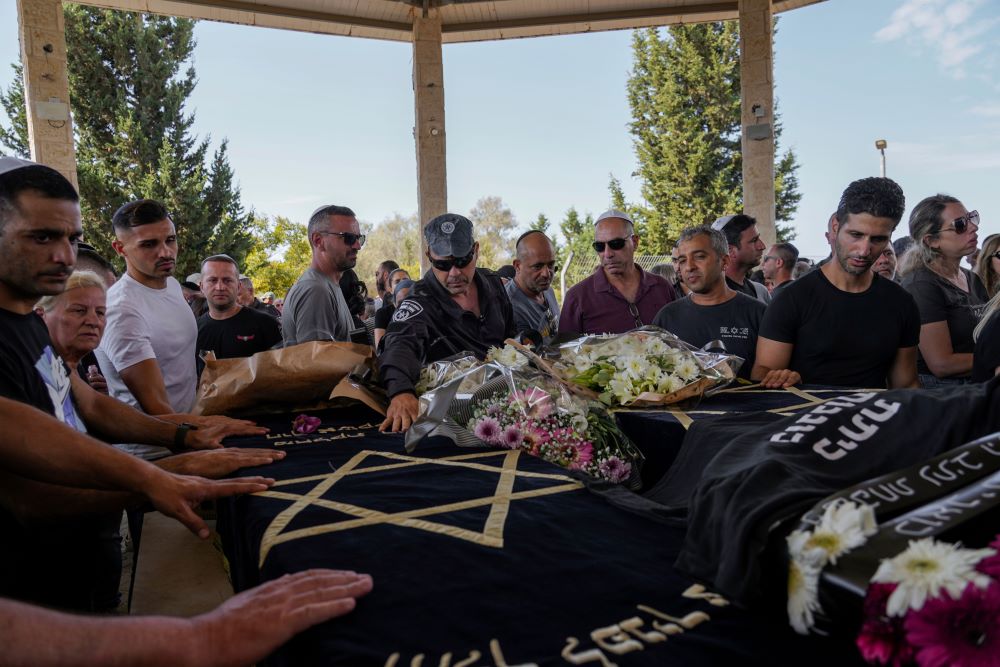 Mourners gather around the coffins of Gil Taasa and his son Or, who were killed in Hamas' terror attack. 18 October. (Alamy)
Mourners gather around the coffins of Gil Taasa and his son Or, who were killed in Hamas' terror attack. 18 October. (Alamy)
Ali Milani, National Chair of the Labour Muslim Network, has called for an "immediate ceasefire" and "an end to indiscriminate killing of civilians and the war crimes being committed".
But Labour MP and parliamentary chair of Labour Friends of Israel (LFI), Steve McCabe criticised calls for a ceasefire, saying it would serve to "protect Hamas".
"People who are calling for ceasefire at the moment may well be sincere and genuine in what they want but I think they're failing to acknowledge what has happened," McCabe told PoliticsHome.
"The only people who would benefit from a ceasefire at the moment would be Hamas."
Yossi Mekelberg, Associate Fellow of the MENA Programme at Chatham House and professor of international relations at the University of Roehampton told PoliticsHome Labour seemed in an "easier" position politically to call a ceasefire than the government because it does not have the UN or other geopolitical responsibilities to consider. But he acknowledged that entrenched internal tensions in the party were likely to be affecting Starmer's choices on foreign policy positions.
"Labour is recovering from the Corbyn-era, and they can’t form a coherent policy when it comes to Israel – it’s all very vague," said Mekelberg.
"I think in Labour when it comes to Israel they believe they need to prove that they’re on the side of Israel."
Under Jeremy Corbyn's leadership between 2015 and 2020, Labour faced allegations of antisemitism, which often arose during discussions surrounding Israel. The party was placed in special measures over the issue by the Equality and Human Rights Commission (EHRC). Earlier this year the party was taken out of special measures following progress on the issue.
The fallout also triggered resignations from high profile Jewish MPs including Luciana Berger, who has since rejoined the party under Starmer's leadership. Corbyn, who had the Labour whip removed in 2021 for saying the antisemitism in Labour was "dramatically overstated for political reasons", has also previously been criticised for inviting Hamas and Hezbollah to an event in parliament in 2009 where he referred to Hamas as "friends" and "an organisation dedicated towards the good of the Palestinian people". He has since said he regrets his comments.
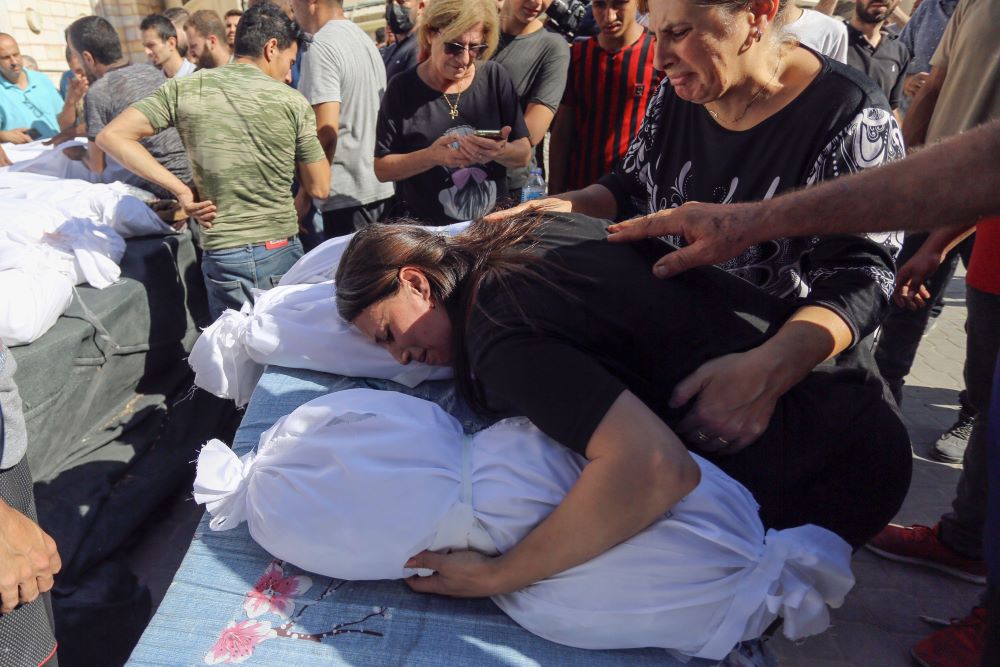 A Palestinian woman mourns over the bodies of her relatives who were killed in Israeli airstrikes that hit a Greek Orthodox church, during their funeral in Gaza City. 20 October. (Alamy)
A Palestinian woman mourns over the bodies of her relatives who were killed in Israeli airstrikes that hit a Greek Orthodox church, during their funeral in Gaza City. 20 October. (Alamy)
Yair Wallach, senior lecturer in Israeli Studies at University of London School of Oriental and African Studies (SOAS), also said Labour's position on a ceasefire could be influenced by the party's history under the former Labour leader. “Labour has been taking a very strong pro-Israel position," said Wallach. "Not quite as strong as the government – but still they haven’t challenged the Israeli government as far as I can see, and this is an extremely hard-right government with elements calling for expulsions of Palestinians. And I think they kind of see it as a correction of the Corbynist elements.”
When it comes to the UK government's position on a ceasefire, both Mekelberg and Wallach said the UK was looking to the US and president Joe Biden. On Wednesday, when asked about supporting a ceasefire, Sunak told MPs in parliament "the first and most important principle is that Israel has the right to defend itself under international law". The Prime Minister's spokesperson said the UK and allies at the UN Security Council were discussing “humanitarian pauses” – not wholesale ceasefires, but creating safer conditions for humanitarian action.
"We are a permanent member of the security council, and a ceasefire would have to be backed by the security council," said Mekelberg. "Everyone is looking to Washington to see if Biden calls for a ceasefire." Mekelberg said Israel's desire to "degrade" Hamas' capabilities and "rescue hostages" is likely driving the position by Biden not to call a ceasefire at this point. On Monday when asked about the prospect of a ceasefire, Biden said: “we should have those hostages released and then we can talk”.
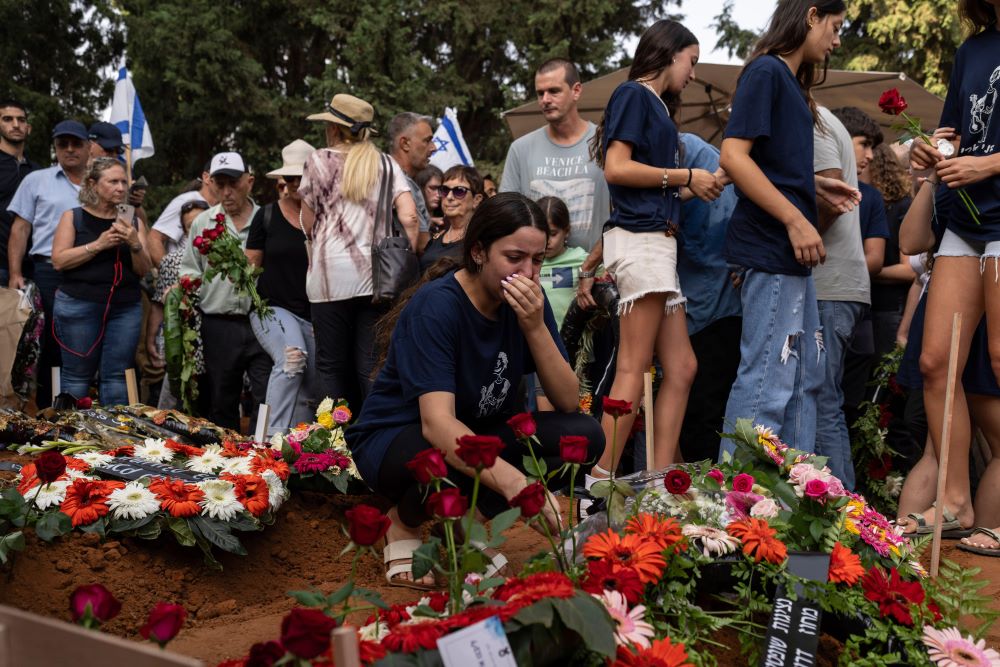 Mourners attend the funeral of Dana Bachar and her son Carmel who were killed in Hamas' terror attack. 24 October. (Alamy)
Mourners attend the funeral of Dana Bachar and her son Carmel who were killed in Hamas' terror attack. 24 October. (Alamy)
The Conservative party has also faced some dissent from within its own ranks on the ceasefire issue. Former chair of the defence select committee Tobias Ellwood told PoliticsHome he believed a ceasefire could assist in securing the release of hostages. "The priority is securing the release of hostages and thanks to back channels this is beginning to happen," he said. "A temporary ceasefire could assist with this important objective."
Senior Conservative peer, Baroness Sayeeda Warsi, told PoliticsHome she believed there should be an "immediate ceasefire".
"We need to listen to the voices that have been most impacted by this," Warsi said. "Including the families who have lost loved ones or awaiting the return of them because they have been taken hostages, families who are at the heart of this tragedy who are calling for peace, who are asking for the grief not to be weaponised, who reject revenge, and who seek long term coexistence for two peoples: the Palestinians and the Israelis."
